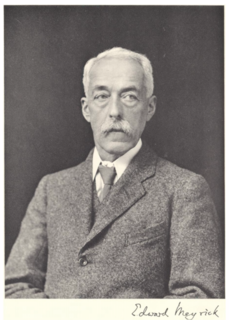
Edward Meyrick was an English schoolmaster and amateur entomologist. He was an expert on microlepidoptera and some consider him one of the founders of modern microlepidoptera systematics.
Sir George Francis Hampson, 10th Baronet was an English entomologist.

Nepenthes maxima, the great pitcher-plant, is a carnivorous pitcher plant species of the genus Nepenthes. It has a relatively wide distribution covering New Guinea, Sulawesi, and the Maluku Islands. It may also be present on Wowoni Island.

Eupterotidae is a family of insects in the order Lepidoptera with more than 300 described species.

Urodidae or "false burnet moths" is a family of moths in the lepidopteran order. It is the type genus in the superfamily, Urodoidea, with three genera, one of which, Wockia, occurs in Europe.
Agathiphaga is a genus of moths, known as kauri moths. It is the only living in the family Agathiphagidae. This caddisfly-like lineage of primitive moths was first reported by Lionel Jack Dumbleton in 1952, as a new genus of Micropterigidae.

George Talbot FES was an English entomologist who specialised in butterflies. He wrote about 150 scientific papers, the majority being primarily systematic, consisting of the description of new species or the revision of various genera. He was also responsible for the curation and preservation of the Joicey collection of Lepidoptera prior to its accession by the Natural History Museum.

The Thyatirinae, or false owlet moths, are a subfamily of the moth family Drepanidae with about 200 species described. Until recently, most classifications treated this group as a separate family called Thyatiridae.
Copitarsia is a genus of moths of the family Noctuidae. The genus was erected by George Hampson in 1906.
Toxocampa is a genus of moths of the family Noctuidae. The genus was erected by Achille Guenée in 1841. Lepidoptera and Some Other Life Forms and The Global Lepidoptera Names Index describe this name as a synonym of Lygephila.
Celonoptera is a monotypic moth genus in the family Geometridae. Its only species, Celonoptera mirificaria, is found in south-eastern Europe. Both the genus and species were first described by Julius Lederer in 1862.

Macrauzata is a genus of moths belonging to the subfamily Drepaninae.
Alucita maxima is a moth of the family Alucitidae. It is found in Libya.
Problepsis maxima is a moth of the family Geometridae. It is found in Japan.
Euparyphasma is a genus of moths belonging to the subfamily Thyatirinae of the Drepanidae. It was described by David Stephen Fletcher in 1979.
Macrauzata maxima is a moth in the family Drepanidae. It was described by Inoue in 1960. It is found in Japan and the Chinese provinces of Sichuan, Zhejiang, Yunnan, Hunan, Fujian and Jiangsu.
Euparyphasma maxima is a moth in the family Drepanidae. It is found in China, Japan and the Korean Peninsula.
Phiala maxima is a moth in the family Eupterotidae. It was described by Lars Kühne in 2007. It is found in the Democratic Republic of the Congo.






